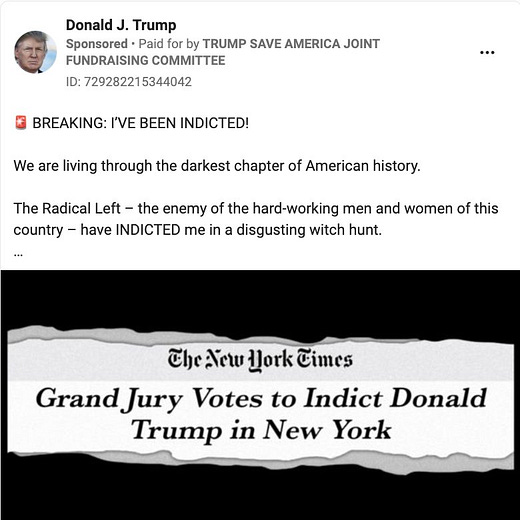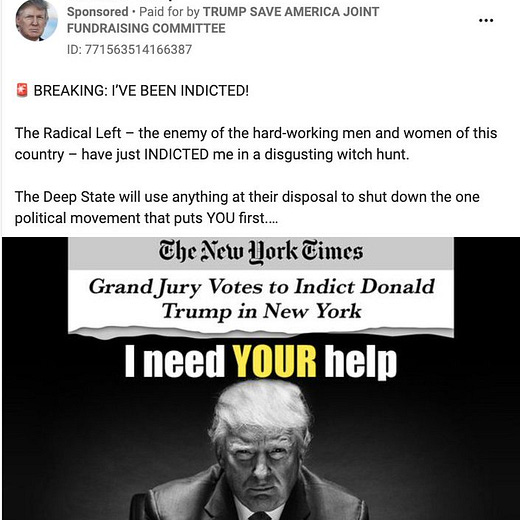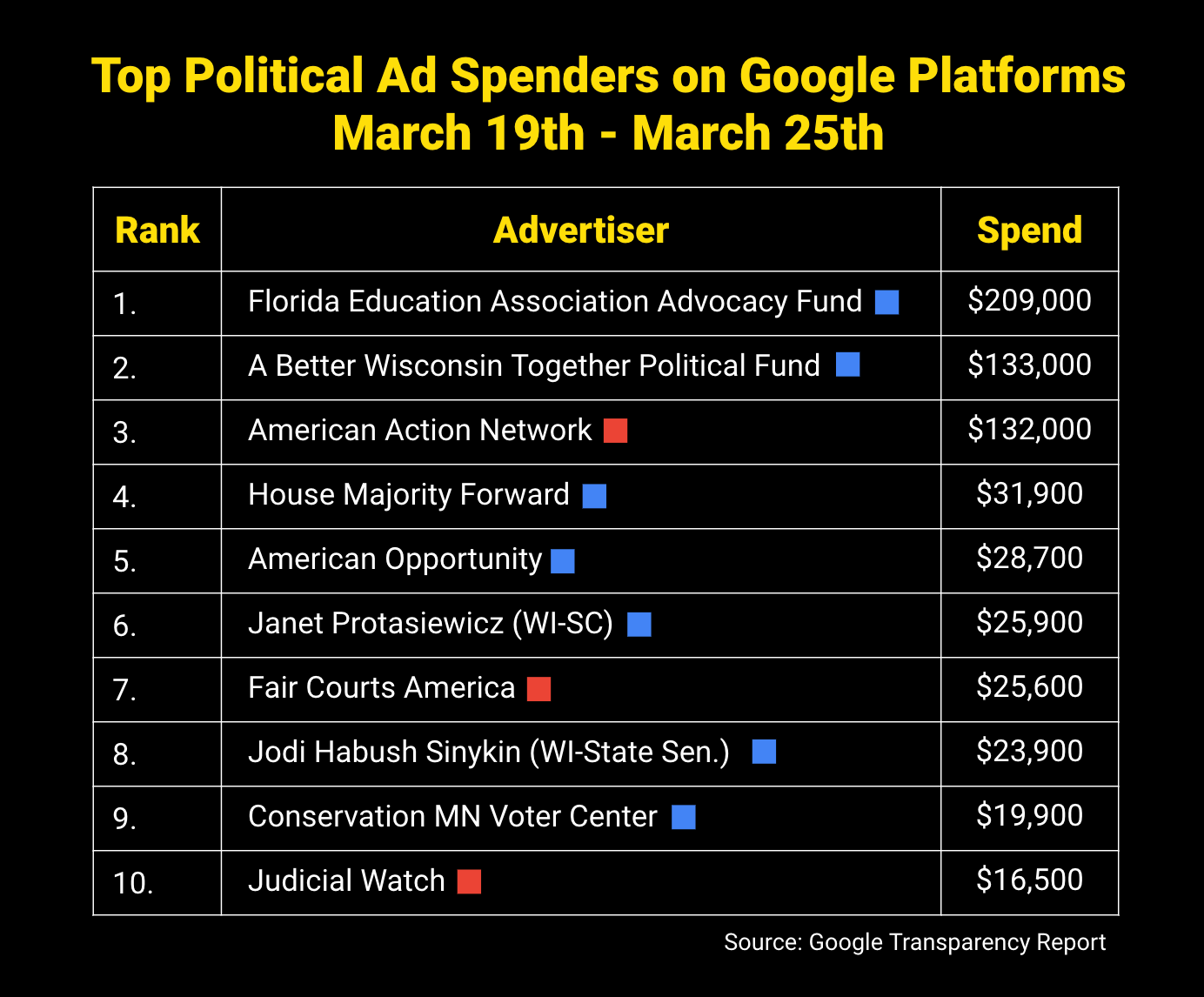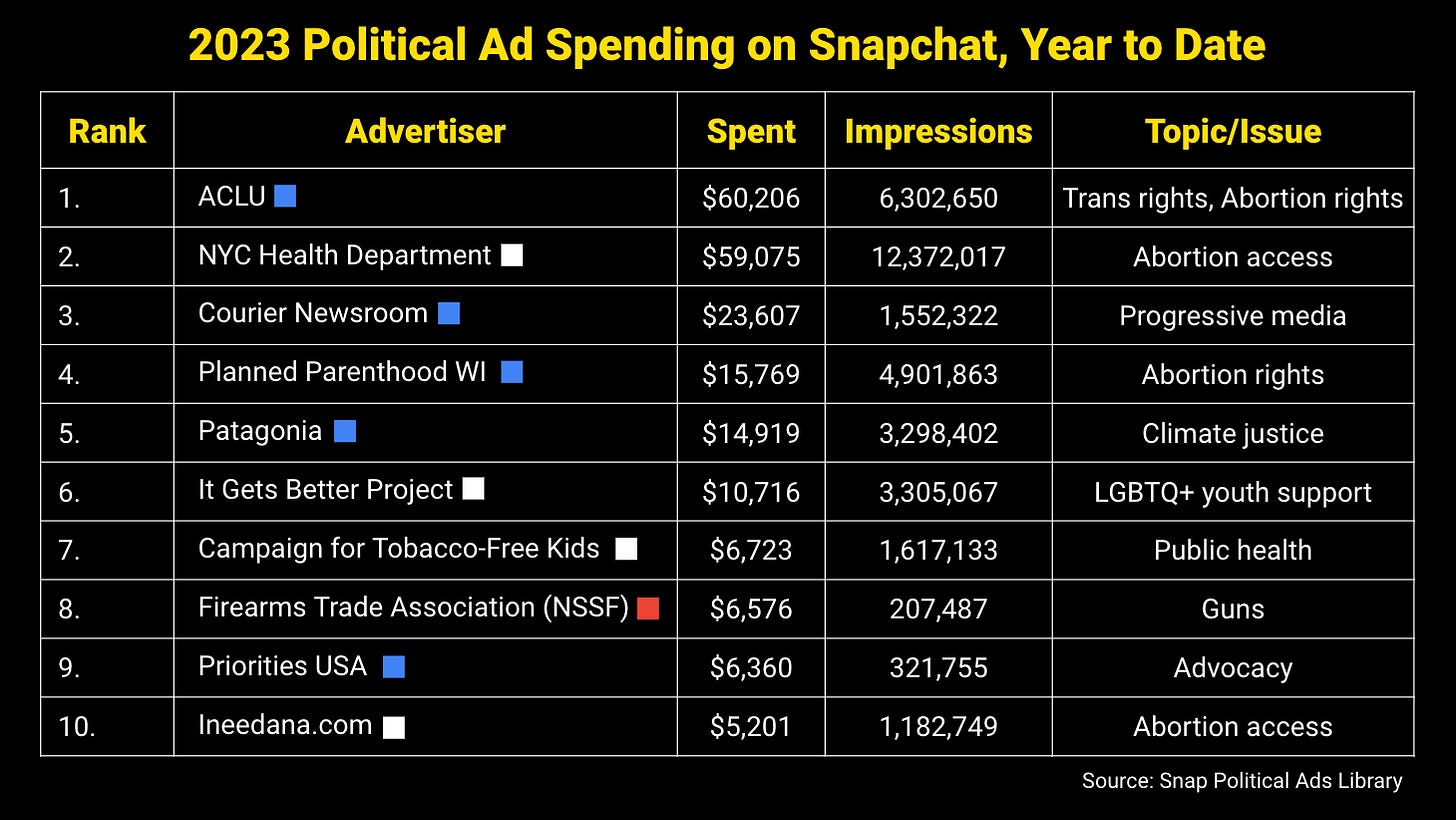America is unprepared for the 2024 political internet
These three online forces will have an unprecedented impact on our politics next year
Even after writing about digital politics for four years, I’m genuinely shocked by how quickly the online political ecosystem is shifting before our eyes. Over the past month alone, the internet has undergone several seismic changes that I believe will have enormous impacts on next year’s presidential election. In this week’s FWIW, I’ll share three things that are keeping me up at night.
But first…
By the numbers
FWIW, political advertisers spent $6.9 million on Facebook and Instagram ads last week. These were the top ten spenders nationwide:
Last night, former President Donald Trump was indicted by a New York grand jury for allegedly making hush money payments to porn star Stormy Daniels. It’s obviously a BFD, and we’ll leave it to the pundits to predict how it plays out politically. One thing’s for certain though: Trump’s team is trying to take advantage of the moment. This morning, his campaign launched new Facebook ads featuring the indictment news and angling for some grassroots cash:
Could this be the first example in U.S. history of a politician proactively sharing news of their upcoming arrest in a political ad?
Meanwhile, political advertisers spent just over $1 million on Google and YouTube ads last week. Here were the top ten spenders nationwide:
A large amount of last week’s Google and YouTube ad spending took place in Wisconsin, where the state’s hotly-contested Supreme Court election has entered its final stretch into Election Day next Tuesday. Here’s a map of where Google ad dollars were allocated nationally last week:
When it comes to digital advertising, Democrats have hugely outspent Republicans on the Wisconsin race.
…and here’s a snapshot of political ad spending on Snapchat, year-to-date:
FWIW discount alert!
As 2024 kicks into gear, FWIW is providing data and insights you can’t get anywhere else. To mark the end of Q1, we’re giving a steep discount on new annual subscriptions, and that gives you exclusive access to paywalled deep dives, bonus posts, and a Tuesday news round-up. Make sure you upgrade in the next 24 hours to get the discount:
From around the internet
We dropped a new issue of our Campaigner newsletter collab with Arena, where I speak with two leading Democratic opposition researchers about their craft ahead of the 2024 election. Read + subscribe here >>
According to a new report by Nielsen, YouTube has become the number-one streaming platform in the U.S.
Google is creating a public archive of all advertising on its platforms, similar to its longstanding political ads archive. This still matters for politics because previously, only ads mentioning federal or state candidates and ballot initiatives have been archived.
2024 dispatch
FWIW, here’s how much money likely or confirmed 2024 presidential candidates have spent on Facebook + Google ads to date (1/1 -3/25):
America is unprepared for the 2024 political internet
Even after writing about digital politics for four years, I’m genuinely shocked by how quickly the online political ecosystem is shifting before our eyes. Over the past month alone, the internet has undergone several seismic changes that I believe will have enormous impacts on next year’s presidential election. Here are three things that are keeping me up at night:
AI-generated everything
Despite working in digital politics and writing about the internet for a living, I’m pretty much a late adopter and harsh skeptic of most new technologies and social media apps. By the time I joined Clubhouse, it was pretty much dead, and I’m still refusing to join TikTok for productivity, mental health, and security concerns. I’ve always thought NFT’s were BS, and I have only given passing consideration to “web3” and the blockchain revolution. So, when AI-generated photos of Donald Trump being arrested went viral last week, I thought they were funny but obviously cartoonish and fake.
Then, I saw an image of Pope Francis wearing a puffer jacket.
In what Ryan Broderick's Garbage Day newsletter called “the first real AI-generated hoax,” someone used Midjourney to create an image of the Pope all dripped out in a Balenciaga puffer and posted it to Reddit. It was then shared widely on Twitter. While scrolling in my feed, I saw it, thought it was legit, and quickly moved on. Only days later did I realize that it was created by AI.
This week, Shane Goldmacher at the New York Times wrote a great piece on how campaign staffers, political technologists, and digital consultants are beginning to think about AI’s use in politics. Most practitioners have already considered how generative AI tools like ChatGPT can draft fundraising emails and text messages that are better than the multitude of spammy appeals filling our inboxes. Machine learning can also optimize dollar amounts that a campaign requests from a specific supporter based on the supporter’s ability and propensity to give. Those things are intriguing and certainly could put some junior digital consultants out of work, but I think those will actually be some of the least disruptive ways AI will impact our politics.
Instead, I think the rapid acceleration in the quality of images, audio, and video created by generative AI tools like Midjourney could wreak havoc on next year’s election. Anyone with an internet connection is now able to create a completely believable photograph of Joe Biden doing anything they want him to do or standing next to whoever they want in about 60 seconds. For instance, here’s a fabricated image I made in Midjourney yesterday:
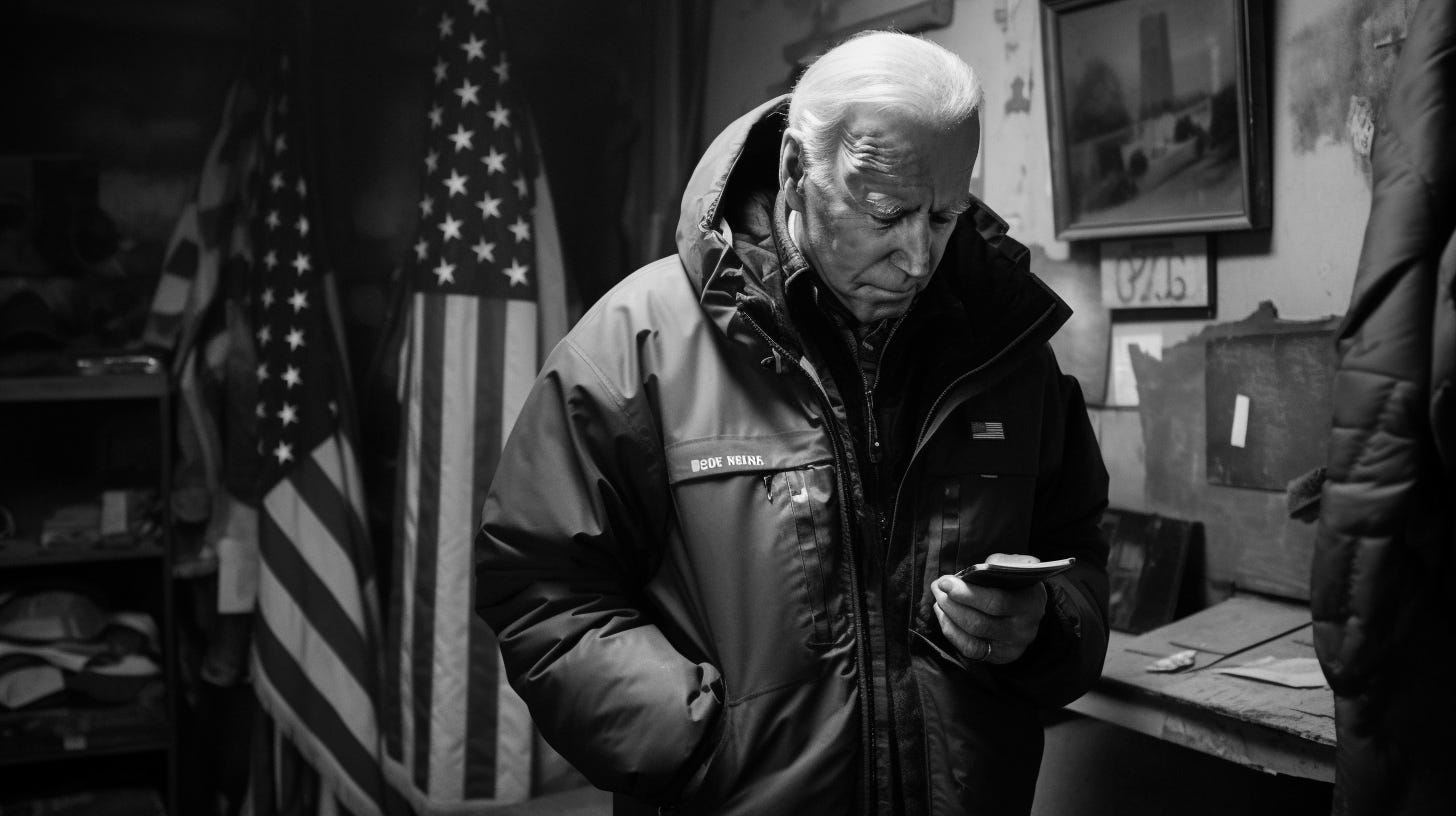
And these AI tools are good now. By next year, they’ll be even better.
Manufactured, realistic images like the one above could be easily used as stills in a longer-form video attack ad. Similarly, I imagine that far-right social media factories and fake news operations will be able to use this type of AI for creating deceptive clickbait, and lefty content farms like Occupy Democrats or the Lincoln Project will deploy them to step up their anti-Trump meme game. Donald Trump’s campaign, which has in the past designed hundreds of photoshopped images and memes for its massive Facebook ad campaigns, will no doubt also look to take advantage of this stuff. They’ll probably be joined by a smattering of dark-money 501c4’s or nameless Super PACs on both sides. It’s going to be The Wild West in America in 2024, and major social platforms will be unprepared or unwilling to detect and control the spread of this type of content.
Facebook’s pivot from politics and Twitter’s slow, painful death
That’s why the recent problems facing several social media giants matter even more. The issues presented by generative AI aren’t occurring in a vacuum, and this rapid technological change is happening during a time of massive upheaval for social media companies themselves.
First, the Facebook that voters and campaigns relied on during the 2016 and 2020 elections no longer exists, as its parent company Meta is deprioritizing news and political content and pulling back its election integrity work. Instead, the company is trying to transform users’ feeds to keep up with TikTok, while also creating a fantasy virtual reality “Metaverse.” Although reducing the spread of political content is probably a good thing given the company’s failures to police it in the past, the company’s deprioritization of its elections team is a major red flag.
Twitter, on the other hand, is dying right before our eyes. The site has long been used by political journalists to follow and engage sources and by Americans of all stripes who were finding and scrolling through verified personalities sharing news and information. Everyone agrees that the conversation on Twitter has an outsized impact on the political news cycle – so its likely demise could upend 2024 in ways that many of us haven’t considered yet.
I’ve been a little skeptical that Twitter would ever eventually sunset, given the media’s reliance on the site. But several pieces of news this week have made me change my mind.
Elon Musk, the company’s owner and CEO, recently announced that legacy verified accounts – mostly journalists, elected officials, and celebrities – will lose their identity verification on April 1st if they don’t pay for a premium subscription. Most will refuse to pay (leading to chaos about discerning which are the real accounts of famous people), and instead of celebrities and public figures, thousands of unverified “verified” accounts being given priority distribution in users’ primary feeds.
That means Twitter will soon become a place where content moderation barely exists, where fewer people are interested in getting their news and information, where tweets from far-right trolls will be distributed to pretty much everyone, and mainstream journalists’ content is deprioritized.
TikTok’s troubles & transparency
With Twitter dying and Facebook pivoting, Americans will spend more screen time elsewhere, and I think TikTok will fill much of that void. Aside from a potential federal ban on the app (which seems unlikely at this juncture) and obvious national security concerns, the app also presents real concerns as a mainstream vector of political information.
Mainly, it’s far less transparent than its well-established competitors. Facebook, Instagram, YouTube, and even Twitter have spent years building up election integrity teams, fact-checking operations, and political ad databases, and in many cases, they’ve partnered with independent researchers to analyze their platforms. TikTok has only begun to think about these issues.
Since TikTok prohibits political advertising, it naturally has no public archive of political ads. However, campaigns and political groups have found clever ways to get around the platform’s ad ban by partnering with creators to create sponsored, election-related content. Technically against the company’s policies but virtually unenforceable, undisclosed relationships between these campaigns and creators (often mediated by third-party firms) will continue to proliferate and create an information ecosystem in which no one knows which content is sponsored or not.
I decided to write all this because I’m not sure that many in the political space (many of whom are still somehow reliant on television advertising) have given enough thought to the impacts of these major technological changes. Even though political campaigns are typically slower to utilize new online platforms and tactics, just a few major instances of abuse of the above platforms and tools could have a major impact on next year’s election.
Ultimately, I think all of this comes down to a question posed in Goldmacher’s piece: What happens when people (or voters) can no longer trust their own eyes and ears? When it comes to the political internet in 2024, I’m afraid we’re about to find out.
That’s it for FWIW this week! If you enjoyed reading today’s newsletter, do us a huge favor and give it a share on Twitter!
Have a tip, idea, comment or question? Shoot me a reply and I promise to respond to every email.






